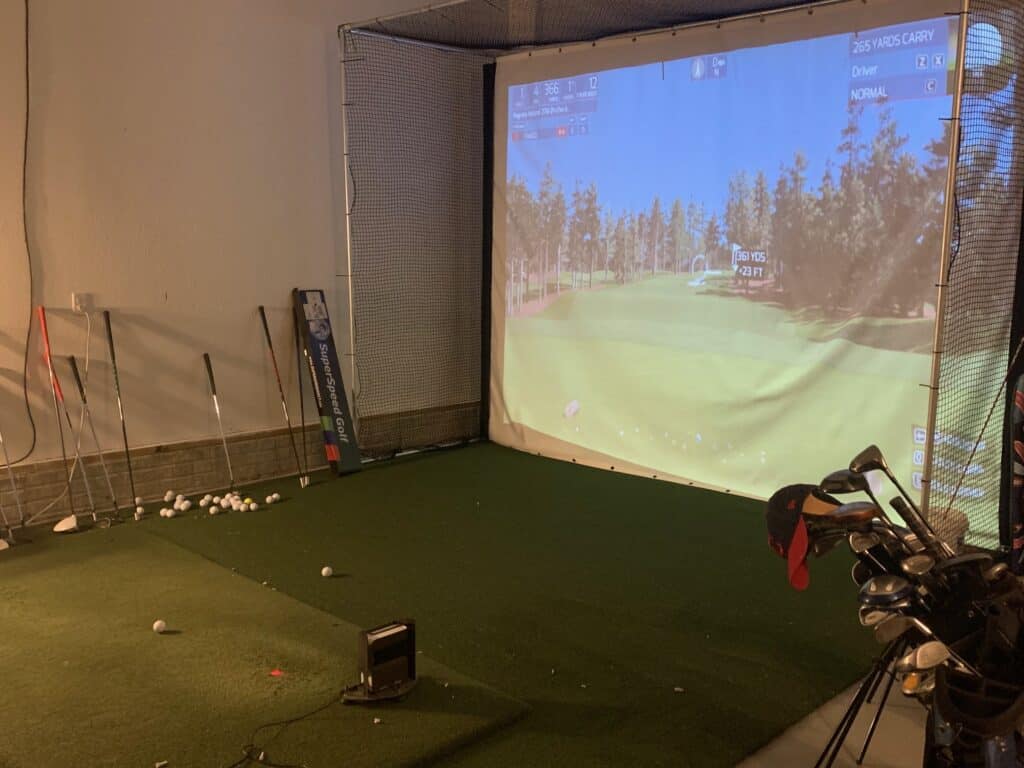Golfers should focus on becoming a high level player on the following shots around the green with the lob wedge:
- A standard flighted chip shot
- The low flier and check shot
- The flop shot
- The bunker shot
One of the most valuable clubs for a high percentage of golfers is the lob wedge.
It is a very versatile club as it can be used in many places around the green and also on shots from around 80 yards and less depending on your swing speed.
The lob wedge is my favorite wedge and one of my most dependable clubs. Most lob wedges will range from 58 degrees in loft up to 64 degrees in loft. The majority of lob wedges for amateurs are 60 degrees. This provides plenty of lob for the shots around the green, yet still allows the golfer to have success from around the 80 yards and less range.
Did you know that 60-65% of shots in golf take place within 100 yards of the hole?
www.nytimes.com
If one can become a high level player with the lob wedge, they can improve their scores and have more consistent scores from having a reliable short game and wedge game in that shorter range.
The lob wedge is a great option for many golfers because of the loft and the amount of bounce that provides a larger margin of error if used properly.
How To Use A Lob Wedge Around The Green
Update: My lob wedge (60 degrees) remain my go to club around the green. I am able to hit a variety of shots and prefer to make a longer more fluid swing on many chips vs a shorter, quicker swing with other clubs.

Key Shot #1: A standard flighted chip shot
The lob wedge is a great option from the fairway or the rough because of the bounce and the extra loft that it provides. Many golf courses today have fast greens and undulated rolling aspects that make hitting anything less than a lob wedge difficult.
For years, many instructors may have taught the low bump and run shot as the premium chip shot, but that shot is diffiuclt to play in many of the situations that golfers face around greens. On most of the modern courses the soft delicate chip shot with the 60 degree lob wedge is ideal.
The golfer will want to set up with the ball in the middle to front of the stance and make a simple back and forth motion. The club should interact with the ground slightly, but overall everything should remain somewhat neutral. Be careful not to use too much wrist hinge or speed at the bottom of the shot. Instead, make a really long putting stroke and build a foundational chip shot.
Learn to use the bounce when chipping – Check out this post!
Once the golfer has established this shot he or she can change the following variables:
There are a total of 9 combinations built on the speed of the swing and the length of the swing.
- Short length and slow speed(Results in shortest shot)
- Short length and medium speed (A bit longer)
- Short length and fast speed (A bit longer)
- Medium length and slow speed
- Medium length and medium speed
- Medium length and fast speed
- Long length and slow speed
- Long length and medium speed
- Long length and fast speed (Results in longest shot)
What degree wedge is best for chipping?
To hit the ball slightly higher, move the ball forwards in the stance. To hit the ball slightly lower, move the ball back in the stance. The golfer from this basic setup with simple motion can have a wide variety of shots to hit.
Recommendation: Build out a chart if you would like on the approximate carry and total distance for each shot above. Use this to decide what shot you are going to hit on the following factors:
- The distance you need to carry the shot
- The combination of flight and roll that would make for an ideal shot
Key Shot #2: The low flier and check shot
This shot requires that you catch the ball clean which means it works best out of a tight fairway lie with a short cut green. You will want to have decent speed in the tempo of your swing and clip the ball to maximize your speed.
This shot takes some precision and leaves little room for error on the crispness of the contact on the chip shot. It will take some practice, but the 60 degree lob wedge is a quality club to hit this shot with.
How to spin your wedges (5 Tips)
Key Shot #3: The flop shot
Here are some tips to help you hit the flop shot: ball forward, open stance, 60 degree lob wedge, keep a consistent pace, use the bounce. You need to stay patient over this shot and allow the club to work down, under and through the shot. Any unnecessary speed or jumping at the bottom could lead to disaster.
Adding some wrist hinge on the backswing and then letting the hinge out and under the shot can maximize your total height if you find yourself in a situation that needs maximum height. On many full swing shots you are trying to compress the ball and reduce the amount of loft on the club, but on the flop shot you want your right hand to come under and make somewhat of a slapping or unhinging motion under the shot.
Complete Post: how to hit a flop shot?
Key Shot #4: The bunker shot
Some golfers might debate or question the best club to use out of a greenside bunker. I would highly recommend your must loften club. The majority of bunkers sit somewhat down and below the putting surface. Any additional height you can get on the shot is frequently needed. If you are playing the traditional short sided bunker shot, go ahead and use the 60 and setup for the following:
- Ball forwards in your stance
- Open up your stance
- Open up the clubface
- Swing and hit behind the ball by about 1-2 inches
- Keep a consistent pace through the shot
How to hit a bunker shot out of wet sand

Next Steps: Use This Formula
If you struggle to break 90, use this formula to take your game to the next level.
- Break down your 18 hole round into separate 9 holes.
- Per each set of 9 holes, hit 3 greens in regulation and 2 putt.
- On the remaining 6 holes, get up and down for par 2 times out of 6.
- This will result in 2 other pars for a total of 5 pars.
- Keep your driver in play and avoid double bogeys.
- Match this same formula on the back nine and shoot 8 over or right around 80 for the round.
- Even if you make a double bogey or two you are still at around an 82 for the 18 holes. A higher percentage of golfers would take this score!
Next Steps: Practice Your Short Game
The fastest way to lower your score and to shoot consistent scores is through the short game. I view the short game similar to being able to play defense in other sports. There are some days your full swing might be a big off, but you can also hit quality chip shots and sink some putts.
The short game, if practiced enough, can be your necessary life vest on those difficult days when the swing is off, the wind conditions are nasty or it is raining. Let’s face it, we don’t always hit the ball how we want, but we can chip and putt somewhat consistent from day to day and round to round.
My Secret To Golf Improvement
Let’s face it, in order to get really good at golf, we must practice frequently. About four years ago, I made the leap and invested in a golf simulator build for my garage. I went with a SkyTrak Launch Monitor and the TGC software and can now play over 100,000 courses including Augusta, Pebble Beach, Bethpage Black, Whistling Straits. St. Andrews and many other of the top 100 courses in the world.
This golf simulator setup, which is more affordable that you might imagine, has been a game changer. I can now play golf everyday of the year regardless of rain, snow, cold weather or time of day. I can practice or play rounds of golf. I can stand in the 11th fairway at Augusta and with the auto-rewind feature I am able to practice my approach shots from various differences.
It is worth checking out through Rain or Shine Golf as they offer some incredible packages along with financing offers that are difficult to beat.
Some direct links to Rain or Shine Golf for pricing and financing:

Take Action – What You Can Do Today to Get Better
What does this mean for you? I believe in the following recipe to get better:
1 – Improve your motion in the golf swing by identifying a golf instructor. Here are some options:
Here is a list of golf instructors that we have reviewed:
2 – Train to swing faster and improve your swing speed. Here are some options:
Looking to gain more Speed and Distance in your swing. Two Options:
3 – Understand course strategy and work to break through your next barrier. Here is a series on breaking through:
We have provided guides on how to break 100, 90, 80 and 70. Check out more below, if interested.
4 – Practice Frequently
Did you know that I build a golf simulator in my garage and have played over 500 rounds of golf on my SkyTrak system? It has been a game changer and one worth checking out. Here are some of my other posts on golf simulators frequently asked questions:
- Is a Golf Simulator Worth It?
- How to Build a Golf Simulator?
- What is the Best Golf Simulator?
- Golf Simulator Accessories?
- How to Build a Golf Simulator for under $7000
- Top 11 Reasons to Buy a SkyTrak
- How to Build a Golf Simulator for Under $1000
- Why Build A Golf Simulator?
- What Space is Needed?
- Can A Golf Simulator Improve My Game?
- How Much Does A Golf Simulator Cost?
- Don’t Forget to Check out our 15 best golf swings of all time.
I am an amateur golfer on a journey to get better, enjoy the game as often as possible and share my passion and knowledge with others. I have coached high school golfers at a high level and have a great passion for the game and want to give back. I enjoy learning about the golf swing and am currently studying to be a certified professional golf instructor. Join me in our journey to get better everyday.

